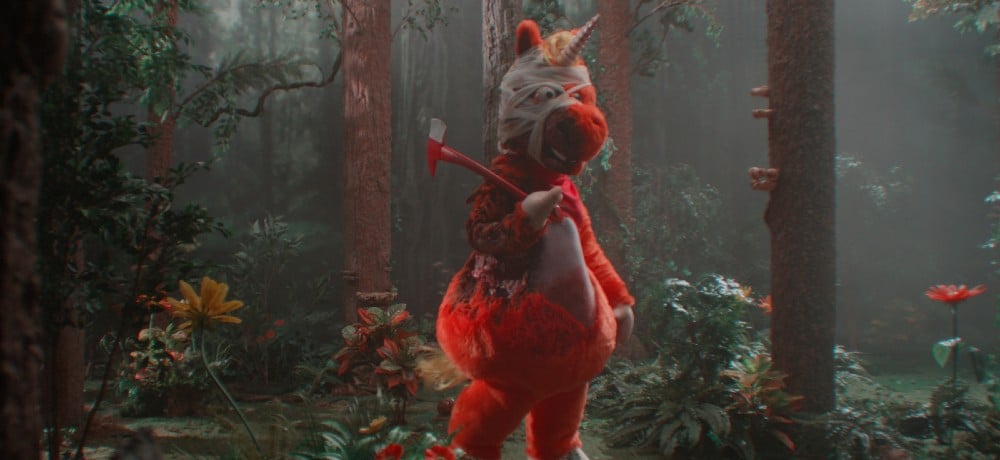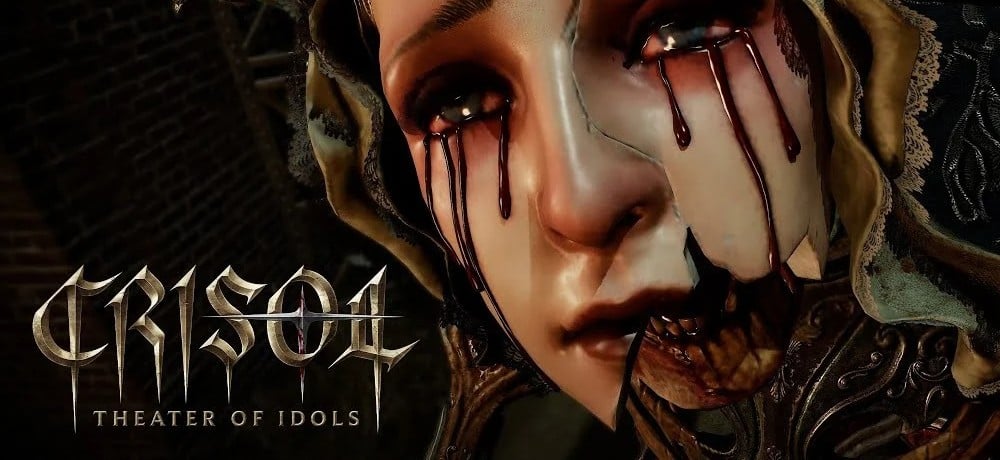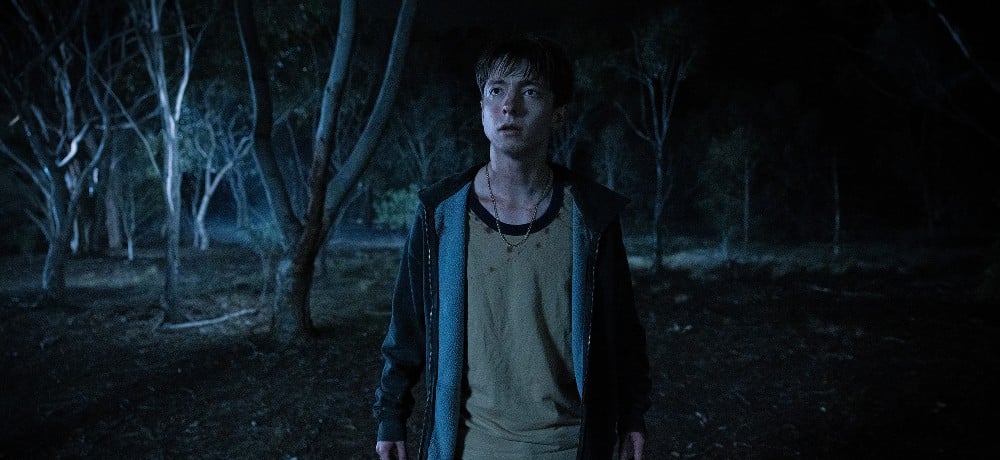





A family fractured by war struggles to hold onto their farm and their sanity in Gwen, an atmospheric chiller from William McGregor. Set in the mountains of Wales during the industrial revolution, Gwen is now in theaters and on Digital HD and VOD platforms from RLJE Films and Shudder, and we recently caught up with McGregor to discuss assembling his talented cast, taking on a period piece for his feature-length debut, and building ever-tightening tension through enigmatic characters who may or may not be dealing with something supernatural.
Congratulations on Gwen, William, it's an immersive experience to watch this movie, and it was your first feature film, too, so kudos to you on creating that atmosphere.
William McGregor: Yeah, thank you very much. Yeah, the film really is exploring dread, so you just hope if people can sit in a cinema and experience that rising tension and that anxiety for 84 minutes, then I've done my job, much to their distress.
Yeah, it's the opposite of a feel-good movie, but that's what makes it so powerful. You've had a lot of work in TV and short-form storytelling, but what made you want to tell this story for your first feature, because it's a period piece, too, which seems kind of daunting in itself to do that for your first feature. But what was it about this story where you said, "You know what, I want this to be my first feature-length movie"?
William McGregor: I think a lot of it's to do with my tastes. I love folklore, I love folk horror and gothic pieces. I just sort of went with the things that I'm interested in, really. Working from a landscape, especially one as epic and sublime as Snowdonia, I find really inspiring. And then just saw these opencast quarries in the landscape and was kind of inspired by them, and found the landscape kind of terrifying. So all of that just fed into setting the film in the industrial revolution.
The environment is like a character itself in the movie. Did you go to this area and write Gwen after being inspired by it, or did you write the screenplay and then look for a place to shoot?
William McGregor: No, with the screenplay, it was written from the location. So I would find things, even the monolithic rock in the middle of this valley, that you can imagine pagan sacrifices happening on it, just walking through these mountains. I don't know how that rock got there or why it's so symmetrical, but it's incredibly inspiring. So lots of the writing actually came from exploring the space. And I also think dread and the uncanny and uneasiness comes from a landscape, which is why I think it's an atmospheric piece, because you are letting the landscape percolate through the screen and build the tension.
Yeah, absolutely. And the fact that you're in the industrial revolution, it feels like the world is teetering on this point of no going back and these people are farming and it just really transports you to that time period. Where exactly did you film? Were you just up in the mountains the whole time for this as well?
William McGregor: So, all of it was on location in Snowdonia, in North Wales. I also think that is an interesting thing about, you want to look at capitalism, you look at industrial revolution. It's a mirror to today in a way, to look back in history to understand where we are now, is a really interesting way of doing it, and it just enables you as a storyteller to examine things that inflect on today rather than being set today.
When you were filming, did you try and keep the cast immersed in that time period in between filming? Did you try to keep that atmosphere alive?
William McGregor: Well, we actually just had to let the atmosphere out between the takes, because I think it's quite a heavy, dark thing to be shooting, that you want to chill out and let everyone relax. The cast had these big teddy bear, fluffy hoodies that they'd put on in between [takes] to keep them warm and try and lighten the tone and enjoy yourselves in between camera takes.
The performances are so good in this, and you have some really strong female characters in the story. In particular, Maxine [Peake] and Eleanor [Worthington-Cox] just knocked it out of the park. That mother-daughter relationship came through so well, and there's so many complexities to that relationship. Did you know either of them coming into this, or did they audition? They just seemed perfect.
William McGregor: Yes, so both I was aware of because, Eleanor, I'd seen her. There's a British miniseries called The Enfield Haunting, which was an incredible ghost story, and she plays a possessed child in it. And she actually got a BAFTA nomination for it here in the UK, so she's one of those young actresses that already has a lot of experience and a hell of a CV. I was lucky to work with her. And the same with Maxine, she also has the same kind of passion about folk horror and folk beliefs and she's just embedded in that world as well. So, I think they just felt like such a natural fit. We were very lucky to have them both, really.
I love that this movie, it's very scary at times, but it builds up those characters and this world and you get to feel like you're in this world and you get to know these people and then the horror comes out of that and their performances. When you were writing it, did you focus on the coming-of-age aspect or the family drama and then let the horror come naturally? Or did you have horror in mind that you wanted to do?
William McGregor: Well, I think the horror is the natural part of this story, because the horror comes from natural places, from being disciplined by a mother, being in this very isolated space, is their mother a witch or not, the suspicion naturally leads to horror. And I think, in a way, because it was funded by the British Film Institute and Film Wales, I wasn't given the commercial nudges that you might have had otherwise, to have jump scares from the beginning. And I know that's probably what a genre audience, maybe would expect from a horror film, but I love a slow burn horror where the horror is reacting to reality. It is about building that tension.
And the whole film's about dread. Dreading what's out there. The experience of hearing something in the night, but not being able to see it and you're on a farm. Even as a kid growing up, for me, hearing foxes outside was terrifying. If you're going to make a film about dread, you almost have to let the horror come very slowly and let it be a slow burn, and not put the jumps scares in at the top, because you then, in a way, release the tension. I just want to keep building the tension.
Yeah, I completely agree with that. The farm location itself is so spooky and I love the ambiguity of your story, too, because you never, especially for first two thirds, we don't necessarily know what is happening. And then you bring in the church element, too, and how there's this correlation between the mother's seizures and the church. So, especially back in that time period, that could really make you a marked person as far as, "Oh, she might be possessed or dabbling with the dark arts."
William McGregor: And again, they're just fearing what they don't understand, and especially for independent women living on their own in that community, that's how witches were prosecuted to begin with. It was a fear of people who are different from you. So, through Gwen, you're looking at superstition and just what is she afraid of? And is it all right? Is being afraid of her mother the right thing? Or actually, it's the bigger fear of losing their home. And I just think questioning where the fear comes from is a fun part of the storytelling.
I also think there's a lot of excitement in the genre now and often you can experiment within the genre. So, sometimes I get nervous about calling it a horror, but I think it's such a horrific watch. If you said it's a drama, people are going to leave it pretty traumatized. So I think that's exciting for horror, that horror can morph and change and have different shapes, and you as a filmmaker are allowed to experiment within it and create new experiences. I think it's really quite a rush, a really exciting part of cinema right now.
With Gwen now in theaters and on VOD and Digital HD from Shudder and RLJE, do you have plans to tell another horror story? What's on the docket for you that you're excited about?
William McGregor: Yeah. So, both of the things I'm working on at the moment, one is actually more of a revenge thriller. But it's about a bloodsport called badger baiting, which is basically when they make badgers fight dogs, and this guy who becomes a bit of a vigilante against that. And then I'm writing a ghost story about a young boy on a farm, which is actually about the experience of being bullied. So, I think I really want to make a ghost story. Those are just some of my favorite films, like The Innocents and The Devil's Backbone work in that world. So I want to do that.